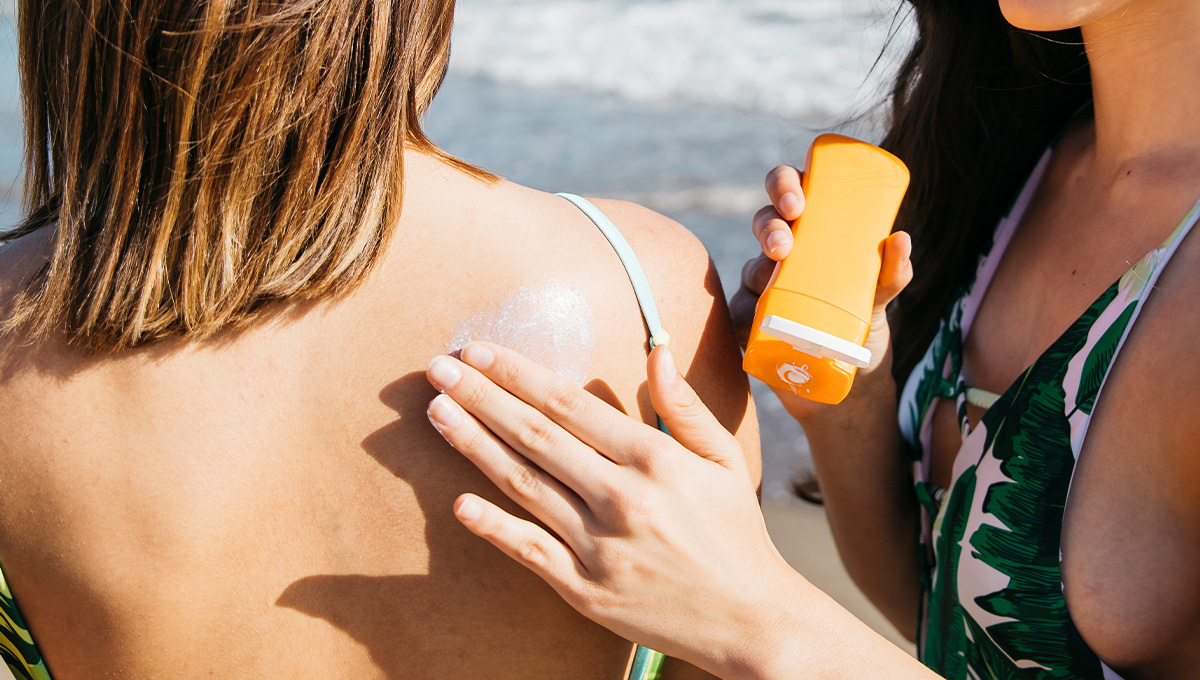
Sun protection products are the most important skin care tools, critical in protecting your skin from
● UV radiation,
● averting sunburns,
● delaying aging,
● and lowering the risk of skin cancer.
Despite popular belief, sunscreen isn’t just for beach days; it should be applied daily, regardless of skin tone or weather. UV light is either absorbed, reflected, or scattered by these products.
Some sun protection myths endure, such as the idea that dark skin tones are immune to the effects of sunscreen or that an SPF of greater ensures protection for the entire day. Nonetheless, it is still essential to use broad-spectrum sunscreen regularly to protect every layer of skin from UV damage. Hence, let’s dive into understanding sunscreen facts and myths for better sun protection.
Myth 1: Sunscreen is Not Needed on Cloudy Days
Untrue. You can get sunburnt on gloomy, chilly, and windy days. Ultraviolet (UV) radiation, not temperature, causes sun damage. Summertime UV levels on chilly or cloudy days can be comparable to sunny, warm days.
Your face turning red in the wind indicates that you probably have sunburn. “Windburn” is an exaggeration. Sun damage can still occur on cloudy days since some clouds allow UV light to pass through and may even intensify owing to reflection off the clouds.
Myth 2: People with Darker Skin Don't Need Sunscreen
Some people think sunscreen is unnecessary for people with darker skin. This is one of the most preached myths about sun protection. This is because melanin acts to filter UVB rays and may provide some degree of sunburn protection. Despite having better natural sun protection, individuals with darker skin are still advised to use full-spectrum sunscreen.
Melanin does not provide the same protection against UVA rays, which can cause wrinkles and early skin aging.
Additionally, melanin cannot shield the skin against prolonged exposure to the sun, such as standing in the sun uncovered for lengthy periods. Additionally, developing skin cancer with dark skin tones is common.
According to one study, those with darker complexion, such as African Americans, Asian Americans, Native Americans, and Pacific Islanders, had the lowest survival rates from skin cancer. These findings suggested that increased screening and knowledge of skin cancer risk are necessary.
Myth 3: A High SPF Sunscreen Blocks All UV Rays
It’s vital to remember that sunscreen with SPF only indicates protection against UVB rays, not UVA rays, even if a higher SPF offers better protection against UVB radiation. In addition to damaging skin, UVA rays raise your chance of developing skin cancer. Thus, seek out broad-spectrum sunscreens that offer UVA and UVB rays protection.
Myth 4: One Application of Sunscreen Lasts All Day
Many people mistakenly believe that one application of sunscreen will provide all-day protection. In actuality, sunlight causes sunscreen to degrade and lose its effectiveness quickly. Sunscreen should be applied at least every two to four hours.
Myth 5: Sunscreen Prevents Vitamin D Absorption
Human health depends on vitamin D, which the body readily produces when exposed to UV radiation. However, sunscreen filters off UV rays. Thus, in theory, a person would not be able to obtain the recommended amounts of vitamin D if they always used sunscreen.
Sunscreens lose efficacy over time, sunlight can penetrate garments, and people are prone to forget to apply sunscreen every time they see the sun. Many doctors and scientists believe the body can produce the right quantity of vitamin D with as little as five to thirty minutes of sun exposure daily.
Myth 6: Only the Sun Causes Skin Aging and Damage
Although the sun is the main source of UV radiation, other sources such as tanning beds and artificial lighting can also cause skin aging and damage. UVA and UVB rays from these sources penetrate the skin and cause wrinkles, pigmentation problems, and collagen breakdown.
Thus, preserving skin health and avoiding premature skin aging requires minimizing exposure to all UV radiation sources.
Myth 7: All Sun Protection Products are the Same
There’s a widespread misconception about sunscreen products functioning essentially the same way. However, sunscreens contain various chemicals that may offer varying UV protection.
People frequently use active substances like ecamsule, zinc oxide, and titanium dioxide to filter out UVA and UVB radiation. Avobenzone is one example of a chemical blocker. Each of these chemicals has a unique manner of blocking the sun.
It is crucial to use a full-spectrum sunblock since it will shield the skin from the widest range of UV rays. The sun protection factor (SPF) is another crucial component to consider. Even on overcast days, the US Food and Drug Administration (FDA) advises using sunscreen every day with an SPF of 15 or higher.
Myth 8: Sunscreen Causes More Harm Than Good
Worries regarding sunscreen chemicals often center on possible health hazards such as hormone disturbance or skin inflammation. However, when used as recommended, a wealth of evidence confirms the safety and effectiveness of sunscreen chemicals.
Before approving sunscreen formulas, regulatory bodies from all over the world thoroughly evaluate their safety. Furthermore, the advantages of using sunscreen to shield against dangerous UV radiation—a recognised carcinogen—far exceed any possible hazards. Regular sunscreen protects your skin from the sun’s UV rays and skin cancer.
Myth 9: You Don't Need Sunscreen If You Wear Makeup with SPF
Untrue. If you plan to be in the sun for a long time, make sure to apply extra sunscreen underneath your makeup unless it is branded with an SPF30 or higher. Use a different sunscreen and repeat it every two hours, rather than just once in the morning, if you plan to spend more time in the sun.
Be advised that most cosmetic products provide protection that is far less than the suggested SPF30 or none at all.
Myth 10: Don’t Bother Using Sun Protection If You Want Sun Tan
It is a common mistake that wearing sun protection prevents one from getting tanning. Sunscreen lowers the danger of sunburn and skin damage while partially blocking UV radiation, enabling a gradual tan.
Pick the appropriate SPF for your skin type and repeat frequently for the best protection. Even with sunscreen, excessive sunlight can still cause premature aging and skin damage.
Conclusion
Those who know the reality of these sunscreen myths can use sunscreen more efficiently. For the best protection, you should adhere to the directions on the sunscreen’s packaging, as these can differ among brands. Applying sunscreen correctly helps prevent sunburn and harm to the skin.
FAQs
1. What is broad-spectrum sunscreen and why is it important?
Wide-range Sunscreens with an SPF of at least 50 shield the skin from UVA and UVB radiation. If the sunscreen is not broad spectrum, even with a high SPF (sun protection factor), it won’t protect you from all UVA rays.
2. How often should sunscreen be reapplied for optimal protection?
No matter how water-resistant the sunscreen is, it should always be repeated at least every two to four hours. After activities that limit its effectiveness, such as swimming, sports, perspiration, and towel drying, one should continually reapply sunscreen.
3. Can sunscreen be used on sensitive skin or around the eyes?
Mineral solutions that contain titanium dioxide or zinc oxide are a wonderful option because they are formulated for delicate skin types and won’t burn your eyes when you perspire. Stick sunscreens are less messy to apply and don’t melt, so they’re great for the eyes.
4. What are the arguments against sunscreen?
It prevents you from getting sufficient D from the sun. It raises your risk of cancer; and ten years after application, sunscreen particles will be found in your brain cells.


